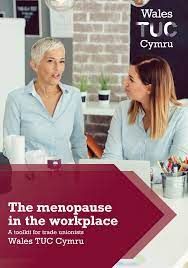50 years of TUC Cymru: Campaigning for equality puts the menopause on the map
Over the following 50 years, there were many struggles for a more equal society, and it must be said, that not all have been won…..Inequality, ableism, racism and hatred of LGBTQ+ people is still far too commonplace in our communities and society, and in some places it is endemic and institutional.
However, there have also been developments, many directly or indirectly because of trade unions and our members who have relentlessly fought for a more equal, fairer and better society. Over the last 50 years, it’s our commitment to equality that has been steadfast and trade unions in Wales have always been a progressive voice for change.
Why is it so important that trade unions are committed to social justice?
Well, for one it’s a key part of who we are. There are some who see trade union membership as nothing more than help if you experience difficulties at work. But we are so much more.
We are an organised group, a collective of people who share values of equality, social justice and wellbeing. We don’t just fight for fairness at work, but across society.
It’s hard to quantify just how much trade unions have impacted on social justice and equality issues in Wales and the rest of UK.
Menopause - a trade union issue?
One of the biggest campaigns that I’ve worked on during my decade of working at TUC Cymru is the menopause campaign.
In 2016 TUC Cymru Congress passed its first resolution on the menopause. It wasn’t a popular motion particularly. In fact, when it was first discussed many male trade unionists left the room believing it wasn’t a discussion for them.
The motion sought to highlight the role of trade unions in challenging attitudes to the menopause. This included campaigning in workplaces and in healthcare, working in partnership with other organisations, raising this issue with employers and making bilingual guidance freely available . Thankfully, it was passed unanimously.
However, in 2016 very little had been done on the menopause, and even less on the specific issue of the menopause in the workplace. As a topic it was still 'hush hush ’and information usually passed from mother to daughter if at all.
Research leading to real change
TUC Cymru started by conducting a survey which ended up being the largest dataset on the menopause in the UK at the time. We held focus groups with Black, Asian and minority ethnic women, LGBTQ+ groups, Disabled women and menopause medical consultants. This information, along with research from WEN Wales and the Older People’s Commissioner, showed us how much work needed to be done on this area. We didn’t shy away from that challenge.
We published a bilingual menopause toolkit and online training module to help workers and reps understand more about the menopause.
We worked with unions and political parties, government, the Senedd and Parliament to campaign for wider changes. We were successful in getting a menopause policy adopted across the devolved public sector in Wales which covers thousands of people.
We were successful in getting a menopause policy adopted across the devolved public sector in Wales which covers thousands of people We also worked closely with employers to make changes in partnership with their Trade Unions.
Putting menopause on the map
Now, for those who experience the menopause there is dignity in the process. Reasonable adjustments can be negotiated, employers are aware of the impact of temperature, light and natural fibres in uniforms. Flexible working patterns can be discussed and there are menopause groups which allow people to learn, offload and embrace their individual experiences as a collective.
This hasn’t been without hard work, and sometimes difficult conversations. As a union officer, I’ve delivered many training sessions to union representatives on this. Sometimes, given how gendered certain workplaces are, it’s been all men. Men who have started out looking like they wanted to be anywhere else.
The training has started with shyness and unease about discussions about the menopause, and without exception, ended with men becoming huge allies – planning motions to trade union conferences, supporting and advocating for menopausal women in the workplace and introducing it into collective bargaining negotiations.
This is one of our campaigns - one which started a menopause revolution and ended up changing the lives of many workers. But it was made by trade union activists like me and you.
Our campaigning for change is what builds this movement, and our contributions are important.
As TUC Cymru enters its second half century, I look forward to seeing how the world of work, society and social justice is shaped again by trade unionists.


